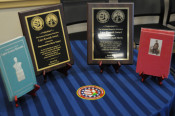 3/26/2018 - On Wednesday, March 21, 2018, the American Hungarian Federation
and the
Victims of Communism Memorial Foundation hosted a Congressional Reception commemorating Hungarian National Day, Lajos Kossuth and the 1848 Hungarian War of Independence, and honoring Representatives Andy Harris (R-MD) and Marcy Kaptur (D-OH), 3/26/2018 - On Wednesday, March 21, 2018, the American Hungarian Federation
and the
Victims of Communism Memorial Foundation hosted a Congressional Reception commemorating Hungarian National Day, Lajos Kossuth and the 1848 Hungarian War of Independence, and honoring Representatives Andy Harris (R-MD) and Marcy Kaptur (D-OH),
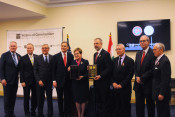 Co-Chairs of the Congressional Hungarian Caucus who were presented with AHF's Lajos Kossuth Award in recognition of their support in strengthening U.S. relations with Hungary and of democracy and human and minority rights in Central and Eastern Europe. Co-Chairs of the Congressional Hungarian Caucus who were presented with AHF's Lajos Kossuth Award in recognition of their support in strengthening U.S. relations with Hungary and of democracy and human and minority rights in Central and Eastern Europe.
The event came a week after the Federation held its annual Hungarian National Day Commemoration held at the Hungarian Embassy.
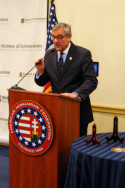 AHF General Counsel (and Co-Chair of the Executive Committe and member of the International Relations Committee) Paul Kamenar, Esq. opened the event and introduced AHF President Ákos L. Nagy who delivered the Welcoming Address. AHF General Counsel (and Co-Chair of the Executive Committe and member of the International Relations Committee) Paul Kamenar, Esq. opened the event and introduced AHF President Ákos L. Nagy who delivered the Welcoming Address.
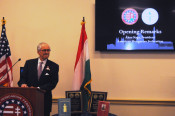 Mr. Nagy recognized guests that included Representatives Marcy Kaptur (D-OH), Andy Harris (R-MD), Dennis Ross (R-FL), French Hill (R-AR) and staff; Anna Smith Lacey,Executive Director of the Hungary Initiatives Foundation; Hungarian Ambassador Dr. László Szabó and his wife Dr. Ivonne Szeverényi; Béla Gedeon, Press and Mr. Nagy recognized guests that included Representatives Marcy Kaptur (D-OH), Andy Harris (R-MD), Dennis Ross (R-FL), French Hill (R-AR) and staff; Anna Smith Lacey,Executive Director of the Hungary Initiatives Foundation; Hungarian Ambassador Dr. László Szabó and his wife Dr. Ivonne Szeverényi; Béla Gedeon, Press and 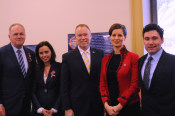 Public Relations Officer, Human Rights and Democracy Promotion; Magor Ernyei, Congressional Liaison Officer; Krisztina Osvát, Counselor, Hungarian Diaspora Relations; and Zsigmond Perényi, Hungarian Deputy Secretary for International Relations. Mr. Nagy commented: "Mr. Perényi's presence tonight is particularly relevant as his Public Relations Officer, Human Rights and Democracy Promotion; Magor Ernyei, Congressional Liaison Officer; Krisztina Osvát, Counselor, Hungarian Diaspora Relations; and Zsigmond Perényi, Hungarian Deputy Secretary for International Relations. Mr. Nagy commented: "Mr. Perényi's presence tonight is particularly relevant as his 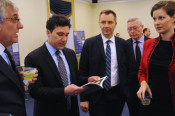 forebear Baron Zsigmond Perényi was one of the martyrs of the 1848 War of Independence, executed in 1849 by the Hapsburgs since, as head of Hungary’s Upper House, he signed the Hungarian Declaration of Independence. forebear Baron Zsigmond Perényi was one of the martyrs of the 1848 War of Independence, executed in 1849 by the Hapsburgs since, as head of Hungary’s Upper House, he signed the Hungarian Declaration of Independence.
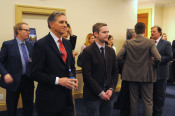 Mr. Nagy thanked the Federation's International Relations Committee who planned this event and acknowledged Committee members in attendance, namely, Frank Koszorús, Jr., Esq., President Emeritus and Chairman of the Federation and the Committee's Chair; Dr. Imre Németh Vice President; Bryan Dawson, Vice President; Paul Kamenar, Vice-Chair of the Executive Committee and General Counsel; Atilla Kocsis, Treasurer; and Dr. Lajos Segesváry, Board Member, Anikó Gaal-Schott, and administrative assistant Judit Csonka who were unable to attend. Mr. Nagy thanked the Federation's International Relations Committee who planned this event and acknowledged Committee members in attendance, namely, Frank Koszorús, Jr., Esq., President Emeritus and Chairman of the Federation and the Committee's Chair; Dr. Imre Németh Vice President; Bryan Dawson, Vice President; Paul Kamenar, Vice-Chair of the Executive Committee and General Counsel; Atilla Kocsis, Treasurer; and Dr. Lajos Segesváry, Board Member, Anikó Gaal-Schott, and administrative assistant Judit Csonka who were unable to attend.
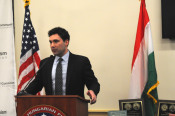 Mr. Nagy then introduced Marion Smith, Executive Director of the Victims of Communism Memorial Foundation who reflected on Hungary's millenia old struggle for freedom and independence, not only in 1848, but also in 1956 where Hungary again rose up against impossible odds to fight Soviet Communists. He added that the Hungarian spirit and fight for freedom extended to the United States where a Hungarian Hussar, Col. Michael Kovats de Fabricy, founded and trained the first American cavalry and died in 1779 near Charleston fighting for US independence in the American Revolutionary War. Mr. Nagy then introduced Marion Smith, Executive Director of the Victims of Communism Memorial Foundation who reflected on Hungary's millenia old struggle for freedom and independence, not only in 1848, but also in 1956 where Hungary again rose up against impossible odds to fight Soviet Communists. He added that the Hungarian spirit and fight for freedom extended to the United States where a Hungarian Hussar, Col. Michael Kovats de Fabricy, founded and trained the first American cavalry and died in 1779 near Charleston fighting for US independence in the American Revolutionary War.
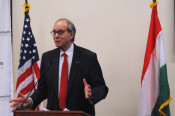 Paul Kamenar introduced AHF Chairman and President Emeritus Frank Koszorús, Jr., Esq. who would deliver the evening's keynote address, "Kossuth Lajos and the Hungarian Revolution of 1848." The speech appears in full below and available for [download]: Paul Kamenar introduced AHF Chairman and President Emeritus Frank Koszorús, Jr., Esq. who would deliver the evening's keynote address, "Kossuth Lajos and the Hungarian Revolution of 1848." The speech appears in full below and available for [download]:
Kossuth Lajos and the Hungarian Revolution of 1848 -
Frank Koszorus, Jr., Chairman, American Hungarian Federation
We are here today to commemorate the Hungarian Revolution of 1848 and the role of Kossuth Lajos as its inspirational and unforgettable leader.
It was a romantic, liberal time in Europe when the Hungarians’ longing for independence from the Hapsburg Empire reached its crescendo and exploded on the European landscape, drawing the admiration of a generation of American leaders and statesmen. Although the revolution was ultimately overwhelmed by invading Austrian and Russian forces, it paved the way for equal status for Hungary in a dual Austrian-Hungarian nation.
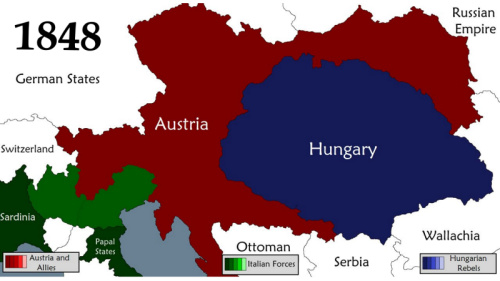 Kossuth himself was to go on a highly acclaimed tour of the United States, including several cities in Ohio. It was in fact in Ohio’s State Legislature where he laid out a truly democratic vision of governance: "All for the people and all by the people; nothing about the people without the people…That is democracy." He proclaimed this vision 11 years before President Abraham Lincoln would do the same in his famous Gettysburg address. Kossuth himself was to go on a highly acclaimed tour of the United States, including several cities in Ohio. It was in fact in Ohio’s State Legislature where he laid out a truly democratic vision of governance: "All for the people and all by the people; nothing about the people without the people…That is democracy." He proclaimed this vision 11 years before President Abraham Lincoln would do the same in his famous Gettysburg address.
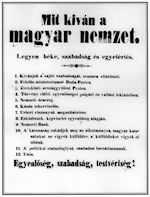 Kossuth’s vision captivated American audiences near and far creating national "Kossuth fever" with parades undertaken in his name and numerous counties and villages also named after him, even newborn children. Few know that in recognition of his stature, he was given the ultimate honor of being invited to speak here before a joint session of Congress. Kossuth’s vision captivated American audiences near and far creating national "Kossuth fever" with parades undertaken in his name and numerous counties and villages also named after him, even newborn children. Few know that in recognition of his stature, he was given the ultimate honor of being invited to speak here before a joint session of Congress.
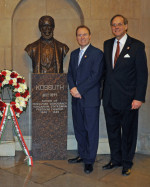 Fewer still know that a bust of Kossuth was presented by our Federation to the American people for placement in the United States Capitol where it can be found in Freedom Foyer. Fewer still know that a bust of Kossuth was presented by our Federation to the American people for placement in the United States Capitol where it can be found in Freedom Foyer.
Some one hundred years later, the ideals which the life of Kossuth exemplified found their full expression again in the Hungarian revolution of 1956 against Soviet occupation. If the revolution of 1848 demonstrated Hungarian valor in the face of oppression, this uprising left no doubt as to its depths as Hungarians from all walks took to the streets and manned barricades against the tyranny of an unaccountable occupying power.
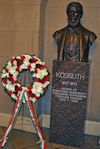 Once again their revolution was met with crushing force. But even so, as Albert Camus wrote of the 1956 revolution, "Hungary conquered and in chains has done more for freedom and justice than any people for twenty years." Once again their revolution was met with crushing force. But even so, as Albert Camus wrote of the 1956 revolution, "Hungary conquered and in chains has done more for freedom and justice than any people for twenty years."
This is a proud legacy, a rare legacy in the annals of history, one which we here today commemorate. Regrettably, it is a legacy easily lost in the ongoing public debates about the pace of evolving Hungarian democracy.
For the critics of Hungary’s current center-right government, democratic advancements are not taking place rapidly enough and are not sufficiently in line with Anglo-American forms.
For its defenders, the country’s series of internationally recognized free elections and economic growth at 4% and unemployment below that number, already represent significant achievements in the last 28 years, which followed some 40 years of communist dictatorship.
One thing is indisputable. While Hungary’s fledgling democracy may not be flawless, anyone familiar with the media landscape there can see examples of criticism in the Hungarian media of government policies, including criticism of the prime minister himself. In fact, the respected Reporters without Borders organization ranks Hungary’s press freedoms above that of Japan and Israel, both allies of the United States.
And just as noteworthy, it was an opposition candidate who last month won a resounding victory in a local parliamentary election. But whatever our political views, inclinations and perspectives of the current political situation in Hungary are, and however critical or supportive we might be, we should rest assured that the ideals of freedom and justice Hungary’s countrymen and countrywomen fought and died for remain embedded within the Hungarian spirit and will find new and creative forms of expression. Hungarians know, and know it well, that their future is theirs and theirs only to determine.
Secretary of State Rex Tillerson acknowledged as much recently when he said that we “recognize that our [European] allies are independent and democratic nations with their own history, perspective, and right to determine their future.”
Kossuth would have applauded Hungary’s current inclusion into the NATO alliance as a strong and committed partner of the United States. For while he passionately believed in national independence, he also believed in the importance of cooperation, even interdependence, among nations,
But just as importantly, and perhaps most importantly, he believed that even only one person, even only one individual could change the world in which he or she lived for the better. It is an ideal that crosses every national boundary and is carried through every passage of time. It is an ideal that can continue to encourage each and every one of us, both here and in Hungary, whatever our respective role might be in putting into practice the democratic values to which Kossuthdedicated his life. Thank you.
Lajos Kossuth Award Presentation
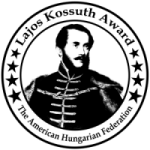 AHF established the Lajos Kossuth Award to recognize government leaders for their support in strengthening U.S. relations with Hungary and of democracy and human and minority rights in Central and Eastern Europe. Paul Kamenar introduced Dr. Imre Németh who would present the first of two Lajos Kossuth Awards to Congressman Andy Harris (R-MD). AHF established the Lajos Kossuth Award to recognize government leaders for their support in strengthening U.S. relations with Hungary and of democracy and human and minority rights in Central and Eastern Europe. Paul Kamenar introduced Dr. Imre Németh who would present the first of two Lajos Kossuth Awards to Congressman Andy Harris (R-MD).
Dr. Németh's comments are below and available for [download]:
Remarks Honoring Congressman Andy Harris -
Dr. Imre Németh, Vice-President, American Hungarian Federation
Good evening, Ladies and Gentlemen!
On behalf of the American Hungarian Federation, it is my privilege to welcome our honoree, Congressman Andy Harris from the First District of Maryland.
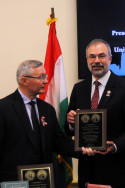 Congressman Harris spent many years as an anesthesiologist at Johns Hopkins Hospital, following in the footsteps of his Hungarian father, Zoltan Haris, who was also an anesthesiologist. Congressman Harris served as a medical specialist in the US Navy Reserve, including serving in Operation Desert Storm. In 1998, he was elected as a Maryland State Senator and continued to serve for 12 years. He then went on to become Maryland’s only Republican Congressman in 2010. Congressman Harris is an advocate of a strong US military force and works to preserve traditional values, among other issues. Congressman Harris spent many years as an anesthesiologist at Johns Hopkins Hospital, following in the footsteps of his Hungarian father, Zoltan Haris, who was also an anesthesiologist. Congressman Harris served as a medical specialist in the US Navy Reserve, including serving in Operation Desert Storm. In 1998, he was elected as a Maryland State Senator and continued to serve for 12 years. He then went on to become Maryland’s only Republican Congressman in 2010. Congressman Harris is an advocate of a strong US military force and works to preserve traditional values, among other issues.
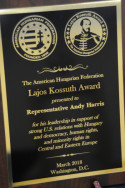 Having been raised by a Hungarian father and a Polish mother, both of whom fled Central Europe immediately after World War II, Congressman Harris’ Hungarian heritage has made him a strong advocate of a free democratic Hungary. He has been a member of the Congressional Hungarian Caucus since 2011 and currently serves as its Co-Chair. Congressman Having been raised by a Hungarian father and a Polish mother, both of whom fled Central Europe immediately after World War II, Congressman Harris’ Hungarian heritage has made him a strong advocate of a free democratic Hungary. He has been a member of the Congressional Hungarian Caucus since 2011 and currently serves as its Co-Chair. Congressman 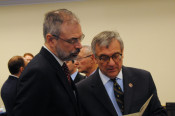 Harris works endlessly to improve relations and to strengthen the bond between the US and Hungary, particularly through efforts with the State Department to promote a strong national alliance and by travelling to Hungary as a member of US Congressional Delegations. Furthermore, Congressman Harris strives to protect the human rights of Hungarian minorities in other parts of Europe. Harris works endlessly to improve relations and to strengthen the bond between the US and Hungary, particularly through efforts with the State Department to promote a strong national alliance and by travelling to Hungary as a member of US Congressional Delegations. Furthermore, Congressman Harris strives to protect the human rights of Hungarian minorities in other parts of Europe.
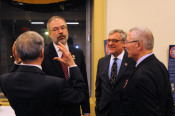 Throughout his endeavors, Congressman Andy Harris has been a supporter of the American Hungarian Federation as well as a close friend. Because of all that he has done to promote US/Hungarian relations, it is my honor to award Congressman Andy Harris with the Lajos Kossuth Award. Throughout his endeavors, Congressman Andy Harris has been a supporter of the American Hungarian Federation as well as a close friend. Because of all that he has done to promote US/Hungarian relations, it is my honor to award Congressman Andy Harris with the Lajos Kossuth Award.
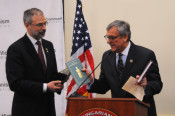 Congressman Harris, please accept this award on behalf of the Federation. Thank you for dedication and service to all Hungarian Americans! Congressman Harris, please accept this award on behalf of the Federation. Thank you for dedication and service to all Hungarian Americans!
Congressman Harris' Remarks
Congressman Harris, who recently returned from a trip to Hungary and Poland as part of a congressional delegation, thanked the Federation for the award and reflected on his Hungarian heritage and his father's time in a Soviet Gulag.
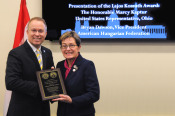 Paul Kamenar then introduced AHF Vice-President Bryan Dawson who would present the 2nd Lajos Kossuth Award to Congresswoman Marcy Kaptur (D-OH). Paul Kamenar then introduced AHF Vice-President Bryan Dawson who would present the 2nd Lajos Kossuth Award to Congresswoman Marcy Kaptur (D-OH).
Bryan Dawson's comments are in full below and available for [download]:
Remarks Honoring Congresswoman Marcy Kaptur -
Bryan Dawson, Vice-President, American Hungarian Federation
Thank you, Ladies and Gentlemen! Please extend a warm welcome to our honoree, Congresswoman Marcy Kaptur.
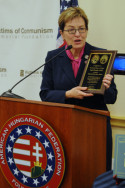 Congresswoman Kaptur represents Ohio’s 9th District that hugs the Lake Erie coastline from Cleveland to Toledo, home to a large number of Americans of Hungarian origin and other Central and East European countries. She was born in Toledo of Polish ancestry, and as we all should know, there is a special millenia-old bond of friendship between Hungarians and Poles. Congresswoman Kaptur represents Ohio’s 9th District that hugs the Lake Erie coastline from Cleveland to Toledo, home to a large number of Americans of Hungarian origin and other Central and East European countries. She was born in Toledo of Polish ancestry, and as we all should know, there is a special millenia-old bond of friendship between Hungarians and Poles.
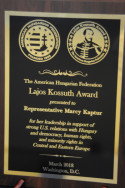 Congresswoman Kaptur serves on the House Appropriations Committee, is a ranking member of the Subcommittee on Energy and Water Development, and also serves on the Interior Subcommittee and the powerful Defense Subcommittee. Congresswoman Kaptur serves on the House Appropriations Committee, is a ranking member of the Subcommittee on Energy and Water Development, and also serves on the Interior Subcommittee and the powerful Defense Subcommittee.
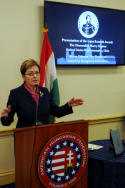 She is a strong advocate for America’s seniors and veterans and was the prime force behind building the World War II Memorial on the National Mall, opened in 2004 after a 17-year effort. She was instrumental in ensuring Hungary took her rightful place in the NATO alliance and continues to advocate for strong transatlantic relations. When some recently doubted US resolve, she was emphatic in her support for the NATO alliance commenting, "it is incumbent the U.S. does not leave any doubt in the minds of our friends, or foes, as to our nation’s firm commitment to defending liberty and upholding our historic alliance with Europe." She is a strong advocate for America’s seniors and veterans and was the prime force behind building the World War II Memorial on the National Mall, opened in 2004 after a 17-year effort. She was instrumental in ensuring Hungary took her rightful place in the NATO alliance and continues to advocate for strong transatlantic relations. When some recently doubted US resolve, she was emphatic in her support for the NATO alliance commenting, "it is incumbent the U.S. does not leave any doubt in the minds of our friends, or foes, as to our nation’s firm commitment to defending liberty and upholding our historic alliance with Europe."
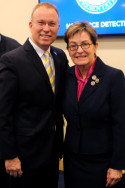 She is a recipient of the Officer’s Cross of the Order of Merit of Hungary in recognition of her outstanding work as Co-Chair of the Hungarian-American Caucus and for providing a significant voice and platform for Hungarian-Americans across the United States. She is a recipient of the Officer’s Cross of the Order of Merit of Hungary in recognition of her outstanding work as Co-Chair of the Hungarian-American Caucus and for providing a significant voice and platform for Hungarian-Americans across the United States.
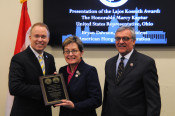 Representative Kaptur has travelled extensively in Central and Eastern Europe, and is familiar with the issues and problems in the region. She is an advocate for the rule of law and human and minority rights. She supported AHF and the Hungarian American community by raising concerns regarding the rights of Rumania's large historic Hungarian community and the need for restoration of church and synagogue properties Representative Kaptur has travelled extensively in Central and Eastern Europe, and is familiar with the issues and problems in the region. She is an advocate for the rule of law and human and minority rights. She supported AHF and the Hungarian American community by raising concerns regarding the rights of Rumania's large historic Hungarian community and the need for restoration of church and synagogue properties 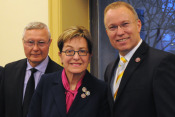 confiscated by the communist regime. She and 20 of her colleagues submitted a letter to Secretary of State John Kerry requesting that the "State Department vigorously engage the Romanian government to end the travesty of justice which it has perpetuated by failing to fully restitute properties illegally confiscated from religious denominations after 1945." confiscated by the communist regime. She and 20 of her colleagues submitted a letter to Secretary of State John Kerry requesting that the "State Department vigorously engage the Romanian government to end the travesty of justice which it has perpetuated by failing to fully restitute properties illegally confiscated from religious denominations after 1945."
The letter also asks Secretary Kerry to focus the State Department’s attention on the upcoming legal proceeding against Attila Markó, Tamás Marosán and Silviu Clim - criminally punished because as members of the official Romanian Property Restitution Committee they restored the Székely Mikó Reformed High School in Sepsiszentgyörgy (Sfantu Gheorghe) to the Hungarian Reformed Church. She and her colleagues concluded by expressing their "conviction that we in the United States consider treatment of religious and ethnic minorities an important measure of democracy." She is a tireless advocate of liberty. Last year, Representatives Marcy Kaptur (D-OH), Dan Lipinski (D-IL), Dennis Ross (R-FL), and Chris Smith (R-NJ) announced the formation of the Victims of Communism Caucus.
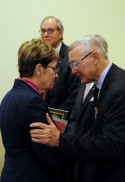 "All for the people and all by the people. Nothing about the people without the people. That is Democracy, and that is the ruling tendency of the spirit of our age." - the words of Lajos Kossuth at the Ohio State Legislature, February 16, 1852, over a decade before Lincoln’s Gettysburg address. "All for the people and all by the people. Nothing about the people without the people. That is Democracy, and that is the ruling tendency of the spirit of our age." - the words of Lajos Kossuth at the Ohio State Legislature, February 16, 1852, over a decade before Lincoln’s Gettysburg address.
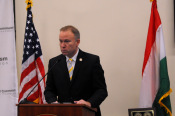 AHF established the Lajos Kossuth Award to recognize government leaders for their support in strengthening U.S. relations with Hungary and of democracy and human and minority rights in Central and Eastern Europe. AHF established the Lajos Kossuth Award to recognize government leaders for their support in strengthening U.S. relations with Hungary and of democracy and human and minority rights in Central and Eastern Europe.
Marcy is very special to our community and I am honored to present her with the American Hungarian Federation’s Lajos Kossuth Award, in recognition of her decade’s long support for strengthening US relations with Hungary and advocating for human and minority rights in the region.
Congresswoman Kaptur, please accept this award on behalf of a grateful community!
Congresswoman Kaptur's Remarks
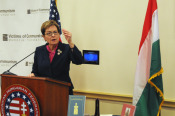 Congresswoman Kaptur, in accepting her award, commented on her love and respect for Hungary and the contributions Hungary has made, including the fact the Hungary has produced more Nobel Prize winners per capita than any other. She made a point to recognize the Hungarian American community in Congresswoman Kaptur, in accepting her award, commented on her love and respect for Hungary and the contributions Hungary has made, including the fact the Hungary has produced more Nobel Prize winners per capita than any other. She made a point to recognize the Hungarian American community in 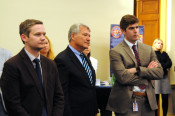 Cleveland who work so hard to preserve their heritage, including saving St. Emeric [Imre] Catholic Church where, incidentally, Florida Congressman Dennis Ross, in attendance, was married. Cleveland who work so hard to preserve their heritage, including saving St. Emeric [Imre] Catholic Church where, incidentally, Florida Congressman Dennis Ross, in attendance, was married.
The Congresswoman then emphasized the need to strengthen transatlantic relations, bolstering the NATO alliance and protecting the United States, Hungary, and 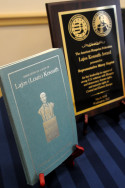 Central and East European allies from Russian meddling in elections and internal Relations as Putin seeks to breed instability in the region. Central and East European allies from Russian meddling in elections and internal Relations as Putin seeks to breed instability in the region.
Presentation of Historic Kossuth Books
Following the award ceremony, Paul Kamenar presented Representatives Kaptur and Harris with copies of 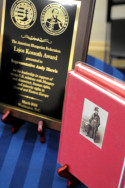 Lajos Kossuth Books: A rare original, gold embossed, 90-page out of print congressional booklet printed to commemorate the 1990 "Dedication of a Bust of Lajos (Louis) Kossuth, Proceedings in the U.S.Capitol Rotunda" and "The Life of Governor Louis Kossuth with his Public Speeches in the United States and a Brief History of the Hungarian War of Independence" originally published in 1852. Lajos Kossuth Books: A rare original, gold embossed, 90-page out of print congressional booklet printed to commemorate the 1990 "Dedication of a Bust of Lajos (Louis) Kossuth, Proceedings in the U.S.Capitol Rotunda" and "The Life of Governor Louis Kossuth with his Public Speeches in the United States and a Brief History of the Hungarian War of Independence" originally published in 1852.
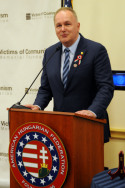 Hungarian Ambassador Dr. László Szabó touched upon the the role of Kossuth in strenghtening ties between the US and Hungary. Today we are natural allies and work together in addressing common challenges in Central Europe. Mr. Szabó congratulated Rep. Marcy Kaptur and Rep. Andy Harris on the Kossuth award and underlined the importance of their longstanding and true friendship. Hungarian Ambassador Dr. László Szabó touched upon the the role of Kossuth in strenghtening ties between the US and Hungary. Today we are natural allies and work together in addressing common challenges in Central Europe. Mr. Szabó congratulated Rep. Marcy Kaptur and Rep. Andy Harris on the Kossuth award and underlined the importance of their longstanding and true friendship.
Paul Kamenar closed the event, thanking all who attended and enouraged all to join and support both the American Hungarian Federation as well as the Victims of Communism Memorial Foundation.
Additional Photos:
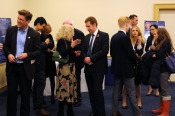 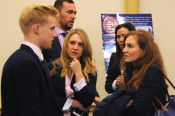 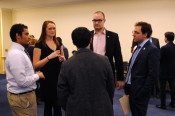
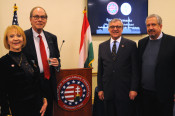 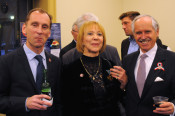 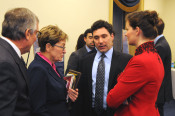
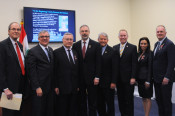 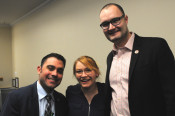 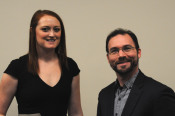
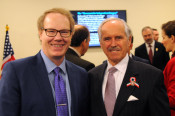 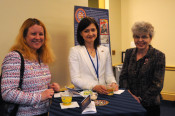 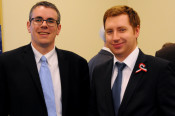
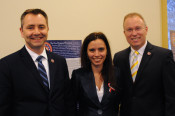 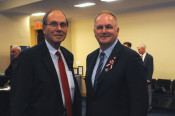 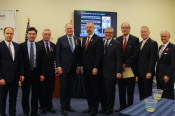 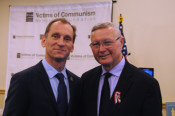 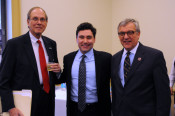 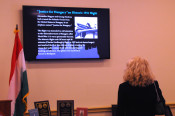 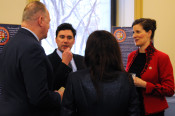 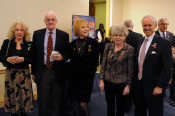 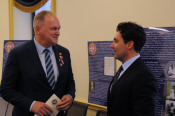
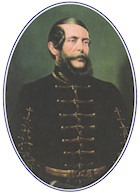 About Lajos Kossuth About Lajos Kossuth
Kossuth
Lajos (b. 1802, d. 1894, pronounced co-shoot luh-yôsh) was Governor of Hungary during fight for independence and democracy which
was eventually defeated by the union of the royalist Austrian Habsburg
and Russian Czarist Armies (1848 - 1849). Despite initial success, it was crushed by the combined royalist forces of Austria and Russia. Many of the leaders of that ill-fated revolt found their way to America where Kossuth would have a remarkable impact.
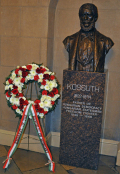 |
"A Gift to the People of the United States from the American Hungarian Federation." The bust is one of only two honoring non-Americans in the Capitol. The base reads, "Kossuth, Father of Hungarian Democracy."
[Read more about the 1990 event] |
"All for the people and all by the people. Nothing about the people without the people. That is Democracy, and that is the ruling tendency of the spirit of our age." - Kossuth spoke these words before the Ohio State Legislature, February 16, 1852, over a decade before Lincoln's famed "for the people, by the people" speech given at Gettysburg in 1863.
Speaking to half the population of the United States at the time and witnessed by heroic welcomes across the country, Kossuth's impact on the United States was nothing short of historic. Kossuth was the first foreign statesman officially invited to the US since the Marquis de Lafayette. His upcoming speech in the Congress of the United States made the pre-civil war joint house nervous due to his democratic views on equality of all men.
Kossuth envisioned a federation in the Kingdom of Hungary in which all nationalities participated in a vibrant democratic system based on fundamental democratic principles such as equality and parliamentary representation. The bloody conflict eventually led to a great compromise known as the "Austro-Hungarian Empire," in which Hungary gained some autonomy, although Kossuth would have no part in it and demanded full independence until his death.
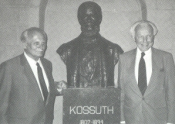 |
Congressman Tom Lantos introduced the resolution accepting AHF's gift to the People. The dedication ceremony took place on March 15, 1990, Hungarian National Day, under the magnificent dome of the Capitol Rotunda.
[Read more about the 1990 event] |
To celebrate and commemorate the friendship and shared values between the people of the United States and those of Hungarian descent, The American Hungarian Federation commissioned a bronze bust of Kossuth and offered it to U.S. Congress. House Concurrent Resolution 251 (Introduced by Congressman Tom Lantos, cosponsored by Congressman William Broomfield and a Senate support motion by Sen. Pell) called for placement of the statue in the US Capitol.
The dedication ceremony took place on March 15, 1990, Hungarian National Day, under the magnificent dome of the Capitol Rotunda. The bust is one of only three honoring non-Americans in the Capitol. The base reads, "Kossuth, Father of Hungarian Democracy."
[Read more] about the Kossuth unveiling.
Today, there are many reminders of Kossuth's impact on America and the
world. In North America, there is a Kossuth County in the state of Iowa,
a town with his name in Indiana, Ohio and Mississippi,
a settlement with a Kossuth Post Office is in Pennsylvania. In addition,
there are Kossuth statues and plaques in New York, Cleveland, Akron, New
Orleans, Washington, and Ontario, Canada. The Hungarian
Reformed Federation's building on Dupont Circle, in Washington, DC
is called Kossuth House with a memorial plaque commemorating his speech
on democracy. See the picture gallery and memorials on Louis
Kossuth in North America.
The renowned Ralph Waldo Emerson said in greeting Kossuth on his arrival
at Concord, MA, May 11, 1852:
"[we] have been hungry to see the man whose extraordinary eloquence
is seconded by the splendor and the solidity of his actions."
Kossuth was greeted with wild enthusiasm across the country. He was only
the second foreign leader (second to Lafayette) to address a joint session
of Congress.
[<< Back to All AHF News]
| Shortcuts:
Related Articles

3/26/2018 - Így kell jó hírét kelteni Magyarországnak: "...fontosabbnak tartotta Washingtonban az Amerikai Magyar Szövetség, hogy a szabadságszerető magyar nép igazi arculatát mutassa be. Ismertesse meg minél jobban hazánk történelmét, a magyar emberek küzdelmét, hogy ezzel is közelebb hozza a két nép barátságát." [tovább]
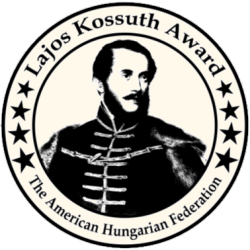 |
| AHF established the Lajos Kossuth Award to recognize government leaders for their support in strengthening U.S. relations with Hungary and of democracy and human and minority rights in Central and Eastern Europe. |

[View the program]
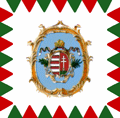 March 15 is Hungarian National Day commemorating the 1848 War of Independence and fight for Liberation and Democracy. Kossuth
Lajos (Louis) (b. 1802, d. 1894, pronounced co-shoot luh-yôsh) was Governor of Hungary and leader during fight for independence which
was eventually defeated by the union of the royalist Austrian Habsburg
and Russian Czarist Armies (1848 - 1849). Kossuth envisioned a federation
in the Kingdom of Hungary in which all nationalties participated in a
vibrant democratic system based on fundamental democratic principles such
as equality and parliamentary representation. The bloody conflict eventually
led to a great compromise known as the "Austro-Hungarian Empire,"
in which Hungary gained some autonomy, although Kossuth would have no
part in it and demanded full indepependence until his death. It also inadvertantly set the seeds for Hungary's dismemberment after WWI at Trianon March 15 is Hungarian National Day commemorating the 1848 War of Independence and fight for Liberation and Democracy. Kossuth
Lajos (Louis) (b. 1802, d. 1894, pronounced co-shoot luh-yôsh) was Governor of Hungary and leader during fight for independence which
was eventually defeated by the union of the royalist Austrian Habsburg
and Russian Czarist Armies (1848 - 1849). Kossuth envisioned a federation
in the Kingdom of Hungary in which all nationalties participated in a
vibrant democratic system based on fundamental democratic principles such
as equality and parliamentary representation. The bloody conflict eventually
led to a great compromise known as the "Austro-Hungarian Empire,"
in which Hungary gained some autonomy, although Kossuth would have no
part in it and demanded full indepependence until his death. It also inadvertantly set the seeds for Hungary's dismemberment after WWI at Trianon
[ < back to AHF 1848 Commemorations]
Shortcuts:
Downloads:
Famous Quotes
 "the house of Habsburg-Lorraine, perjured in the sight of
God and man, had forfeited the Hungarian throne." "the house of Habsburg-Lorraine, perjured in the sight of
God and man, had forfeited the Hungarian throne."
Hungary, April 1849
"All for the people and all by the people. Nothing about
the people without the people. That is Democracy, and that is the ruling
tendency of the spirit of our age."
Spoken before the Ohio State Legislature,
February 16, 1852
Audio
Resources
 Hear
Louis Kossuth Speak! [Click Here] - This is the speech of Louis Kossuth which he gave for the dedication of the statue for the 13 Hungarian generals, who were executed at Arad, Hungary, on October 6, 1849 (Arad is in Rumania today after annexation due to the Treaty of Trianon in 1920 ).
Louis Kossuth was exiled after the fall of the Hungarian Liberation Fight of 1848 and made his permanent home in Torino (Turin), Italy. He could not attend the dedication of the monument at Arad, without risking arrest, so he recorded his speech inTurin, and sent it to Arad using the new technology of sound recording, called the phonograph. Hear
Louis Kossuth Speak! [Click Here] - This is the speech of Louis Kossuth which he gave for the dedication of the statue for the 13 Hungarian generals, who were executed at Arad, Hungary, on October 6, 1849 (Arad is in Rumania today after annexation due to the Treaty of Trianon in 1920 ).
Louis Kossuth was exiled after the fall of the Hungarian Liberation Fight of 1848 and made his permanent home in Torino (Turin), Italy. He could not attend the dedication of the monument at Arad, without risking arrest, so he recorded his speech inTurin, and sent it to Arad using the new technology of sound recording, called the phonograph.
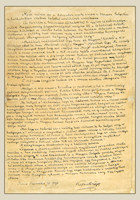 The recording was made on September 20, 1890, when Kossuth was 88 years old. It is a sad fact that the monument Kossuth sent his speech for was torn down by the Rumanian government when they annexed Transylvania, along with Arad, in 1920, after World War I. The recording was made on September 20, 1890, when Kossuth was 88 years old. It is a sad fact that the monument Kossuth sent his speech for was torn down by the Rumanian government when they annexed Transylvania, along with Arad, in 1920, after World War I.
The original
recording on two wax cylinders for the Edison phonograph survives to this
day, although barely audible due to excess playback and unsuccessful early
restoration attempts. Lajos Kossuth is the earliest born person
in the world who has his voice preserved. Since the audio
is of such poor quality, here is it is transcribed in Hungarian and translated
to English (special thanks to Louis
Kossuth in North America)
Hungarian |
English |
"A világ bírája
a történelem fog e kérdésre felelni. Legyenek
a szentemlékû vértanúk megáldottak
poraikban, szellemeikben a hon szabadság Istenének
legjobb áldásaival az örökkévalóságon
keresztül; engem ki nem borulhatok le a Magyar Golgota porába,
engem október 6-a térdeimre borulva fog hontalanságom
remete lakában látni a mint az engem kitagadott Haza
felé nyújtva agg karjaimat a hála hû
érzelmeivel áldom a vértanúk szent emlékét
hûségükért a Haza iránt, 's a magasztos
példáért, melyet az utódoknak adtanak;
's buzgó imával kérem a magyarok Istenét,
hogy tegye diadalmassá a velõkig ható szózatot,
mely Hungária ajkairól a Magyar Nemzethez zeng. Úgy
legyen Ámen!
Turin
September 20 1890
Kossuth Lajos |
"The judge of the universe,
history, will decide over this question. Should the saintly remembered
martyrs be hallowed in their ashes, in their spirit with the highest
blessings of the Lord of Liberty and through eternity; I can not
pay my sympathies to the ashes of the Hungarian Golgotha, but October
6 will find me on my knees in this reclusive home of exile, as I
open my arms to my disowning homeland. With gratitude's faithful
sentiments, I bless the martyrs' sacred memory for their faith in
their homeland and for the sublime example they left to their heirs:
with ardent prayer I beg the God of Hungarians to make their appeal
which echoes from the lips of Hungaria to the Hungarian Nation.
So be it, Amen!
Turin
September 20 1890
Lajos Kossuth |
|
Click to hear the recording: |
"Kossuth Lajos azt üzente,
elfogyott a regimentje.
Ha még egyszer azt üzeni,
mindnyájunknak el kell menni,
Éljen a magyar szabadság,
Éljen a haza ! |
Esik esõ karikára,
Kossuth Lajos kalapjára.
Valahány csepp esik rája,
Annyi áldás szálljon rája,
Éljen a magyar szabadság,
Éljen a haza!" |
Links
- AHF and the Kossuth Bust in the US Capitol
- AHF commemorating 1848
- President Bush Honors 1848 and Hungary's Contributions to Democracy
- HRFA's excellent Kossuth in America [visit]
- Select Speeches of Kossuth, Condensed and Abridged, with Kossuth's
Express Sanction [visit]
- Louis Kossuth, Mason And Apostle Of World Democracy [visit]
- Count Apponyi's Oration on the Death of Louis Kossuth [visit]
- Wikipedia - [visit]
and add your thoughts!
- Louis Kossuth in North America [visit]
- Kossuth County, Iowa [visit]
- Kossuth County, Iowa statue dedication
[visit]
- Dedication of statue to replace one destroyed by
Rumanian occupation
forces in 1921:
Gyergyócsomafalva, Transylvania [visit]
|



